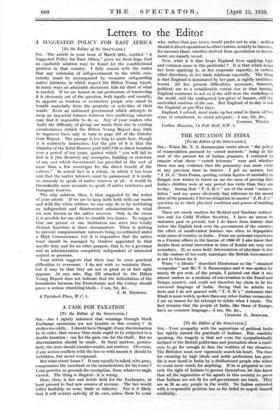Letters to the Editor
A SUGGESTED POLICY FOR. EAST AFRICA [TO the Editor of the SPECTATOR.] SIR;—The article in your issue of March 29th, entitled " A Suggested Policy for East Africa," gives me fresh hope that an, equitable solution may be found for the constitutional problem in that country. I fully concur with the writer that any extension of self-government to the White com- munity must be accompanied by measures safeguarding native interests, in which respect the Hilton Young report, in many ways an admirable document, falls far short of what is needed. - If we are honest, in our professions of trusteeship it is obviously out of the question, both legally and morally, to appoint as trustees or co-trustees people who stand to benefit-materially from the property or activities -of their wards. Even an unbiassed government which' attempts to keep an impartial balance between two conflicting interests May find it impossible to do so. Any of your readers who doubt the difficulty of giving our wards their due in existing circumstances (which the Hilton Young Report does little to improve) have only to turn to page 187 of the Ormsby Gore Report. The passage is too long to quote here, though it is extremely instructive, but the gist Of it is that the Akamba of the Kitui Reserve paid'1207;749 in direct taxation over a period of ten years, against which " you" will fail to find in it' [the Resent] any enterprise, building or 'structure of any sort. which Government' has provided at the cost of more than a few sovereigns for the direct benefit of the tatiVes." In actual fact in a colony, in which" it has been Said that the native interests must be parathount, it is really an anomaly to speak of native reserves at all : it would be theoretically more accurate 'to speak of native territories and European reserves.
' The only solution, then, is that suggested by the writer
of your artiele. If we are to keep faith "both with our wards and with the white settlers, we can only do so "by instituting an independent and disintereAed administration in what are now known as the native reserves. Only- hi the arena is it possible for one rider to straddle two horses. To suggest that one person or one institution can serve two totally distinct functions is sheer obscurantism. There is nothing to prevent complementary interests being co-ordinated under a High Commissioner, but it is imperative that the native trust should be managed by trustees appointed to that specific duty and for no other purpose, that is, by a governor and an administration completely independent of interested
control or pressure. - Your article suggests that there may be some practical
difficulties to overcome. I do not wish to minimize these, but it may be that they are not so great as at first sight appears. At any rate, Map III attached to the' Hilton Young Report does not indicate that the delimitation of the boundaries between the Protectorate and the Colony should prove a serious stumbling-block.—I am, Sir, &c., 8 TaOiltock Place, W.C. I. J. H. DRIBERG.


























































 Previous page
Previous page